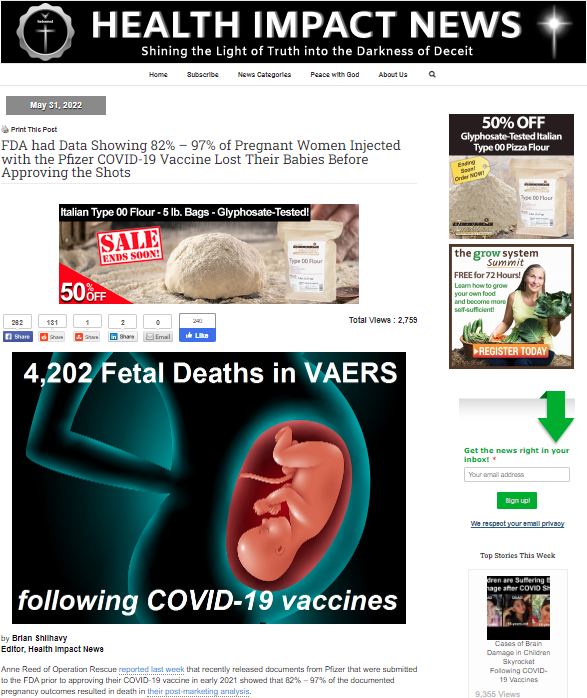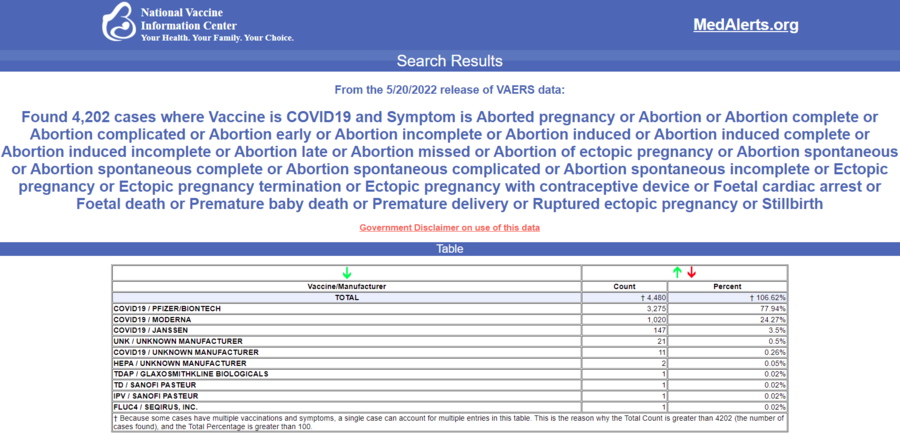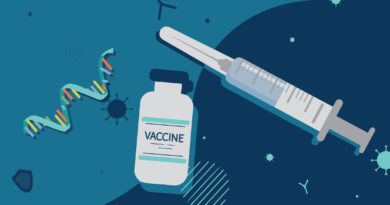Fact Check: Pfizer Vaccine Data Given To FDA Does NOT Show Up To 97% Of Vaccinated Pregnant Women Lost Their Babies

Does data given to the Food and Drug Administration before Pfizer COVID-19 shots were officially approved show up to 97 percent of vaccinated pregnant women lost their babies? No, that’s not true: The Pfizer document that was released as part of an ongoing Freedom of Information Act lawsuit does not provide the total number of pregnant women in 63 countries who received a shot during the period from December 1, 2020, through February 28, 2021. Without that figure, it’s impossible to calculate the percentage of pregnant women who had a spontaneous abortion or similar event following vaccination. But the Pfizer COVID vaccine is recommended by the Centers for Disease Control and Prevention (CDC) for everyone 5 and above.
Also, a Lead Stories analysis of the numbers found in the Vaccine Adverse Event Reporting System (VAERS), based on data through May 20, 2022, wasn’t able to duplicate the claimed results of 4,202 fetal deaths following COVID vaccines. Plus, no conclusions can be reached from VAERS reports until they are verified.
The claim appeared in an article published (archived here) by Health Impact News on May 31, 2022, titled “FDA had Data Showing 82% – 97% of Pregnant Women Injected with the Pfizer COVID-19 Vaccine Lost Their Babies Before Approving the Shots.” It opened:
Anne Reed of Operation Rescue reported last week that recently released documents from Pfizer that were submitted to the FDA prior to approving their COVID-19 vaccine in early 2021 showed that 82% – 97% of the documented pregnancy outcomes resulted in death in their post-marketing analysis.
This is what the post looked like on the Health Impact News website at the time of writing:
(Source: Health Impact News screenshot taken on Thu Jun 2 20:09:06 2022 UTC)
FDA and CDC
In a June 2, 2022, email to Lead Stories, the Food and Drug Administration (FDA) said:
To date, FDA and CDC have not identified any safety signals for harm to fetuses following administration of the FDA-approved and authorized COVID-19 vaccines. As with all vaccines, including COVID-19 vaccines, we will continue to carefully monitor the vaccines for safety. For your information, CDC published a report in January from a study involving the Vaccine Safety Datalink. According to the report, in a large, multisite retrospective cohort study, receipt of COVID-19 vaccine during pregnancy was not associated with increased risk for preterm birth or small for-gestational age at birth. increased risk for preterm birth or small-for-gestational-age birth. More info on this can be found in January’s MMWR (Receipt of COVID-19 Vaccine During Pregnancy and Preterm or Small-for-Gestational-Age at Birth — Eight Integrated Health Care Organizations, United States, December 15, 2020-July 22, 2021) available on CDC’s website here.
The CDC says COVID vaccines are safe for everyone age 5 and above, including those planning families. Information from the CDC says:
- Pregnant and recently pregnant people are more likely to get severely ill with COVID compared with non-pregnant people.
- Getting a COVID vaccine can help protect you from severe illness from COVID.
- COVID vaccination is recommended for people who are pregnant, breastfeeding, trying to get pregnant now or might become pregnant in the future.
- Pregnant people may receive a COVID vaccine booster shot.
Children 5 to 17 years old can receive the Pfizer vaccine, as well as adults. The Moderna and Johnson & Johnson shots are approved for those 18 and older. Details on the vaccines can be found here.
The CDC recommends COVID-19 vaccines while pregnant or breastfeeding:
A new CDC analysis of current data from the v-safe pregnancy registry assessed vaccination early in pregnancy and did not find an increased risk of miscarriage among nearly 2,500 pregnant women who received an mRNA COVID-19 vaccine before 20 weeks of pregnancy. Miscarriage typically occurs in about 11-16% of pregnancies, and this study found miscarriage rates after receiving a COVID-19 vaccine were around 13%, similar to the expected rate of miscarriage in the general population.
VAERS data
The 4,202 fetal deaths due to COVID vaccines in the image at the top of the story are credited to the VAERS database, run by the CDC and the FDA. Lead Stories couldn’t match the figures cited by Health Impact News. We came up with much different numbers on June 2, 2022, for VAERS data available through May 20, 2022.
The VAERS website includes this stipulation when searching for data results:
VAERS data … are updated every Friday. Hence, results for the same query can change from week to week.
Lead Stories came up with 1,819 fetal deaths in a VAERS search that correlated COVID vaccine reports with the same 25 “adverse events” that Health Impact News included in the sourcing of information for its story.
Using the same criteria, but searching the National Vaccine Information Center, the Health Impact News article came back with 4,202 fetal deaths associated with COVID vaccines:
(Source: National Vaccine Information Center screenshot taken on Thu Jun 2 21:53:42 2022 UTC)
The nonprofit National Vaccine Information Center bills itself as “an independent clearinghouse for information on diseases and vaccine science, policy, law and the ethical principle of informed consent.” Founded under the name Dissatisfied Parents Together (DPT) in 1982, it has been criticized as a leading source of misinformation about vaccines. The National Vaccine Information Center shares VAERS data, but without the standard warnings of its limitations.
Lead Stories has debunked several claims about vaccine deaths that misuse VAERS.
Anyone with internet access can add a report to the VAERS list of reports. The public access link to it expressly warns against unwarranted conclusions based on VAERS material because the list only provides a tally of unverified notes about any health event people experience after they are vaccinated.
The list itself cannot be used to prove or quantify, since all it shows is a chronological correlation, not the causal link that would be more difficult to establish. It’s the equivalent of a police precinct’s running “blotter” reports that may serve as a starting point for police work, not an endpoint.
VAERS website warnings include:
When evaluating data from VAERS, it is important to note that for any reported event, no cause-and-effect relationship has been established. Reports of all possible associations between vaccines and adverse events (possible side effects) are filed in VAERS. Therefore, VAERS collects data on any adverse event following vaccination, be it coincidental or truly caused by a vaccine. The report of an adverse event to VAERS is not documentation that a vaccine caused the event.
This article has been archived for your research. The original version from Lead Stories can be found here.




